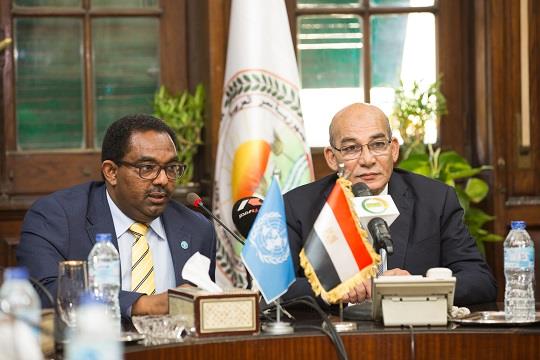MARL and FAO sign Egypt CPF to improve agricultural productivity and food security

Dr. Abdel El Moneim El Banna, Minister of Agriculture and Land Reclamation, and Dr. Hussein Gadain, FAO Representative in Egypt
24 April 2018, Cairo, Egypt - His Excellency, Dr. Abdel El Moneim El Banna, Minister of Agriculture and Land Reclamation, along with Hussein Gadain, FAO Representative in Egypt, have signed today the Country Program Framework (CPF) for Egypt 2018 –2022.
The Minister of Agriculture stated that FAO has a significant role in contributing to Egypt’s food security and agricultural development projects. He added that the cooperation between both institutions dates back to the foundation of the Organization. Egypt was one of the first member countries to accredit FAO as a UN organization specialized in enhancing the global food production, developing forests and fisheries, and helping to preserve the natural and genetic resources of water and soil, which are essential in promoting agricultural production
Al-Banna highlighted that over the past 45 years, FAO has participated in the implementation of agricultural and rural development programs by providing advisory services in the areas of planning, programming, and policy analysis and also providing technical assistance in a wide range of areas related to agriculture.
The signed CPF aims at guiding FAO’s partnership with and in support to the Government of Egypt, combining innovative international best practices and global standards with national and regional expertise during the CPF’s five-year duration.
The minister stated that the CPF takes into account the agricultural implementation plan for development, which is a cornerstone in achieving the Sustainable Development Strategy 2030. These goals have three main components: institutional reforms, reviewing the agricultural policies, and development and investment programs.
“CPF 2018-2022 is in line with the Sustainable Development Strategy of Egypt Vision 2030 as well as FAO’s strategic objectives. It will concentrate on government priorities, including improving agricultural productivity, enhancing food security in strategic food commodities and increasing the sustainable use of natural agricultural resources,” said Gadain.
“Such priorities will be achieved by focusing on a variety of strategies, while developing national policies and plans for food security and nutrition and policies for extending social protection to include the rural areas. Moreover, we can achieve these goals by focusing on modern technologies needed to increase water productivity and to adapt to climate change, and by emphasizing on the relation between water, energy and food. Finally, achieving these priorities will help Egypt achieve the sustainable development goals (SDG), especially SDG2 Zero Hunger,” Gadain added.
Egypt’s CPF was prepared following consultations and in agreement with the relevant Ministries of the Egyptian Government, namely the Ministry of Agriculture and Land Reclamation (MALR), the Ministry of the Environment (MoE), the Ministry of Foreign Affairs (MoFA), the Ministry of Investment and International Cooperation (MIIC), the Ministry of Supplies and Internal Trade (MSIT), the Ministry of Trade and Industry (MoTI), the Ministry of Water Resources and Irrigation (MoWRI), the Ministry of Planning Monitoring and Administrative Reform (MPMAR) and the Ministry of Social Solidarity (MoSS); as well as faculties of agriculture of national universities and national non-governmental organizations (NGOs) operating in the rural sector.
